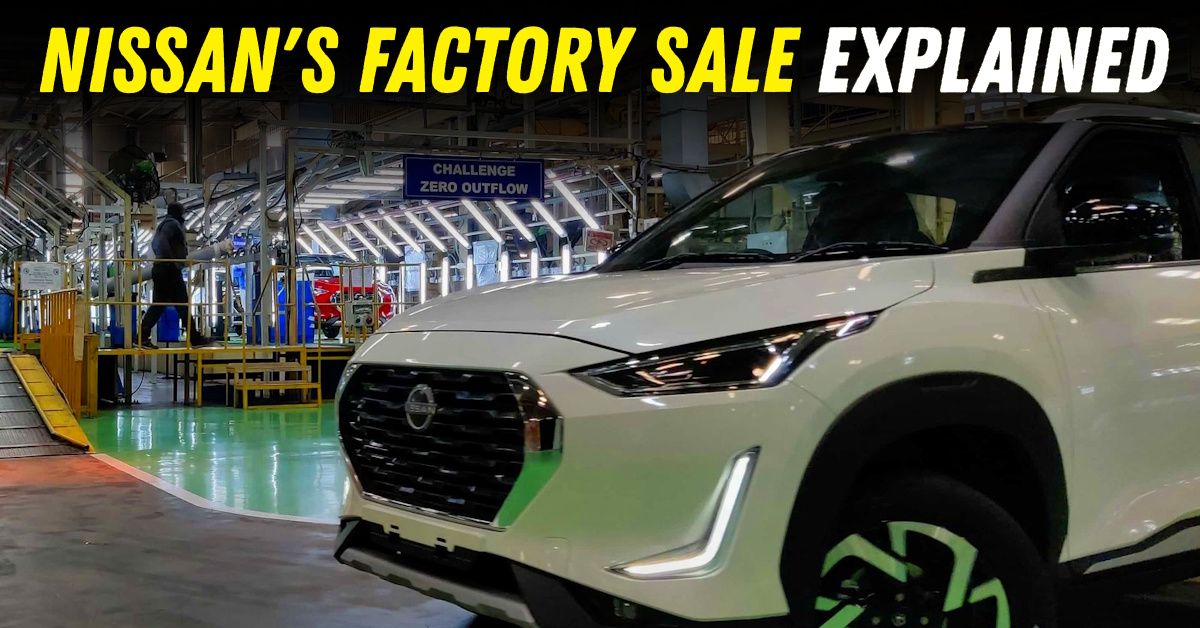Why's Nissan Selling Off Its India Factory Stake To Renault: We Explain


Renault’s move to acquire Nissan’s decision 51% stake in Renault Nissan Automotive India Private Ltd (RNAIPL) marks a major shift in their long-standing partnership. This move reshapes the companies’ strategies in India and has far-reaching implications. Here’s a closer look at the reasons behind the decision and its potential impact on the Indian automotive market.
One of the key reasons for Nissan’s exit from manufacturing in India is its renewed focus on sales and service. Despite more than a decade in the Indian market, Nissan has struggled to gain traction, holding only a 0.7% market share in FY25. By stepping away from factory operations, the company aims to concentrate its resources on improving customer experience, expanding its dealership network, and introducing new models tailored for Indian buyers.
Frank Torres, President of Nissan India, has reaffirmed the company’s commitment to the Indian market. However, going forward, Renault will handle vehicle production at the Chennai facility while Nissan prioritises marketing and distribution.
The sale of its majority stake in RNAIPL will free up significant financial resources for Nissan. Running a manufacturing plant comes with heavy fixed costs, including labour, maintenance, and operational expenses. By transferring full control of the Chennai facility to Renault, Nissan can reduce these costs and reallocate funds towards global priorities.
Additionally, the sale provides an immediate cash boost, giving Nissan greater financial flexibility. This is crucial as the company undergoes a global turnaround under its new CEO, Ivan Espinosa, and seeks to invest in research, digital services, and market expansion.
This move is part of a broader restructuring within the Renault-Nissan alliance. Both companies recently reduced their cross-shareholdings, giving them greater operational independence while maintaining areas of collaboration. Nissan’s exit from direct manufacturing in India aligns with this shift, allowing it to focus on a leaner, more efficient partnership model.
By taking complete control of the Chennai-based manufacturing facility, Renault strengthens its position in one of the world’s fastest-growing automobile markets. This move unlocks several strategic benefits for the French automaker, setting the stage for expansion and long-term growth.
With Renault now the sole owner of RNAIPL, the company gains complete autonomy over manufacturing decisions. This independence allows Renault to streamline production, focus on its own vehicle lineup, and implement plans for new platforms like CMF-B, which will underpin upcoming models such as the next-generation Duster and Bigster SUVs. The ability to make swift operational decisions could see Renault accelerate product rollouts in the Indian market.
Renault is gearing up for a product offensive in India, with major launches slated for the coming years:
• Next-generation Duster – A highly anticipated SUV making a comeback.
• Bigster – A larger, three-row SUV designed to rival the Mahindra XUV700 and Tata Safari.
Both these models will be based on the CMF-B platform, which brings modern features, better cost efficiencies, and improved localisation for Indian buyers. Renault’s full control over RNAIPL ensures a seamless production strategy aligned with market needs.
Renault is also doubling down on its EV ambitions in India through its dedicated unit, Ampere. With ownership of the Chennai plant, the company can develop and manufacture electric models like a future A-segment EV, reinforcing its presence in India’s rapidly evolving electric mobility landscape. Government incentives and growing consumer interest in EVs make this an opportune time for Renault to expand its electrification roadmap.
The Chennai facility benefits from an established and cost-effective supplier ecosystem, which Renault can now leverage more efficiently. Strengthening ties with local suppliers will help the company reduce costs, ensure a steady supply of components, and create a robust supply chain to support both domestic sales and exports.
Despite the ownership change, Renault and Nissan will continue working together in key areas. The Chennai plant will still produce Nissan models like the Magnite, and both companies will share resources at the Renault Nissan Technology & Business Center India (RNTBCI). This arrangement allows Renault to retain the benefits of collaboration while independently executing its India strategy.
Renault’s acquisition of Nissan’s stake in RNAIPL is more than a financial transaction—it’s a strategic step toward greater flexibility, efficiency, and market expansion. By gaining full control over manufacturing, Renault can better align production with its global and local strategies, roll out competitive new models, and enhance its presence in the evolving Indian automotive market. With the right execution, this move could mark a new phase of growth for Renault in India and beyond.